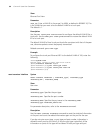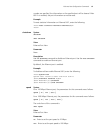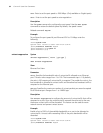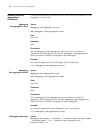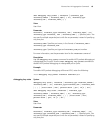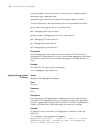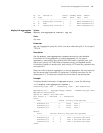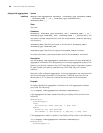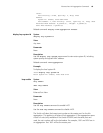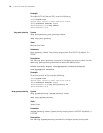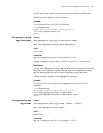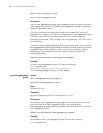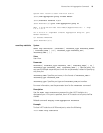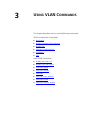68 CHAPTER 2: USING PORT COMMANDS
display link-aggregation
interface
Syntax
display link-aggregation interface { interface_type interface_number
| interface_name } [ to { interface_type interface-num |
interface_name } ]
View
Any view
Parameter
interface { interface_type interface_ num | interface_name } [ to {
interface_type interface_ num | interface_name } ]:
Specifies ports. You
can specify multiple sequential ports with the
to parameter, instead of specifying
only one port.
interface_name: Specifies port name, in the format of interface_name =
interface_type interface_num.
interface_type: Specifies port type and interface_num port number.
For more information, see the parameter item for the interface command.
Description
Use the display link-aggregation interface command to view detailed link
aggregation information at a designated port, including aggregation group ID for
the port, port priority, operation key, LACP state flag, partner information (system
ID, port number, port priority, operation key, LACP state flag, LACP packet
statistics).
Note that unlike a dynamic aggregation, a manual aggregation has no protocol to
get the remote peer information of the partner. Therefore, every item for the
remote peer is 0. This does not indicate the actual state of the remote peer.
Example
To display detailed link aggregation information of a link aggregation member
port, enter the following:
<4500>display link-aggregation interface ethernet4/0/1
If the aggregation has been created manually, the display will be similar to the
following:
Ethernet4/0/1:
Attached AggID: 1
Local:
Port-Priority: 32768, Oper key: 1, Flag: 0x00
Remote:
System ID: 0x0, 0000-0000-0000
Port Number: 0, Port-Priority: 0, Oper-key: 0, Flag: 0x00
If the aggregation is static or dynamic, the display will be similar to the following:
<4500>display link-aggregation interface ethernet4/0/1
Ethernet4/0/1:
Attached AggID: 20



